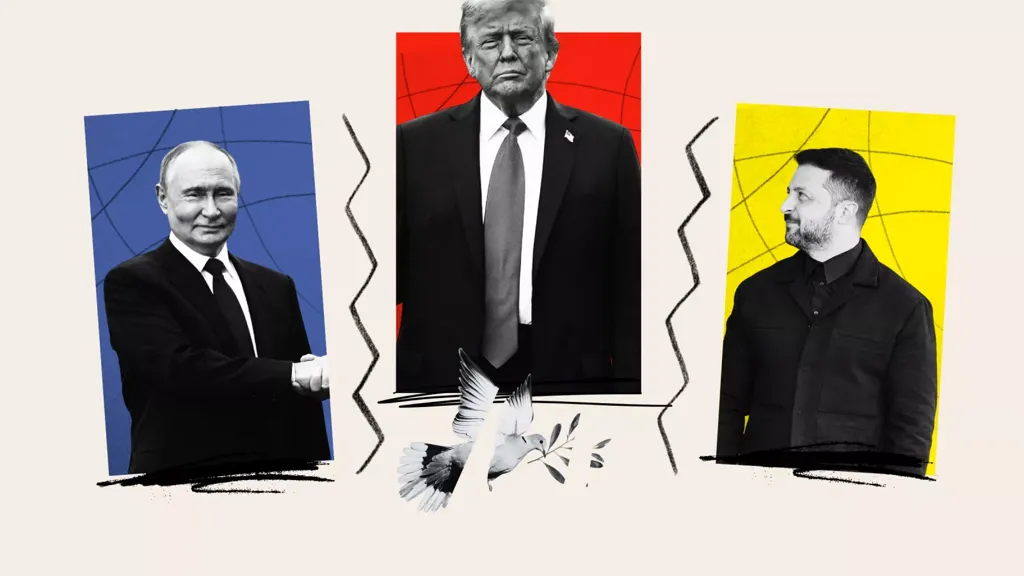President Donald Trump met with both Russian President Vladimir Putin and Ukrainian President Volodymyr Zelensky in the past week. The talks ranged from security guarantees for Ukraine to possible future meetings between the three leaders.
Do these meetings represent real progress toward an end to the war? Is Trump the right person to bring peace to Ukraine? Newsweek contributors Steve Cortes and Faisal Kutty debate:
Steve Cortes:
We have strong reasons to believe that President Trump will bring a lasting peace, ending this horrendous conflict. First, he has been consistently anti-war his entire political career, in stark contrast to the careerists and veteran politicians of Washington. As shown by the Abraham Accords and the recent truce in the Azerbaijan-Armenia conflict, he always defers to diplomacy first. Trump also smartly recognizes that Ukrainian security questions are primarily the provenance of the wealthy countries of Europe, and not the United States. He further displays a healthy distrust of the corrupt Zelensky, who manipulated Joe Biden for years with maximalist demands. Peace beckons!
Faisal Kutty:
No, we should not be optimistic that Trump can broker a durable peace between Russia and Ukraine. He has repeatedly praised Putin, dismissed Russian war crimes, and floated land deals that reward aggression by freezing illegal territorial gains. His impulsive diplomacy and disregard for allies make a sustainable peace unlikely. Worse, Trump's condescending and coercive relationship with Zelensky -- evident since the impeachment scandal -- undermines trust. True peace demands principled, transparent negotiation grounded in respect for sovereignty and international law. Trump offers theatrics, not diplomacy. His approach risks sacrificing Ukraine's future for the illusion of quick results and personal political gain.
Cortes:
America has no vital national security interest in this ancient Black Sea ethnic conflict. That said, because Trump inherited a totally unnecessary war, he works diligently to achieve peace. Putin himself admitted the war never would have happened with Trump in office. The reckless killing must end, and America cannot afford to fund senseless foreign conflicts.
Kutty:
Calling Russia's invasion an "ancient ethnic conflict" whitewashes war crimes. Trump didn't "inherit" this war -- Putin waited until he left. Citing Putin as proof of Trump's peacemaking isn't diplomacy; it's deference. Peace isn't surrender or legitimizing land grabs -- it's justice and accountability. And let's not forget: Trump's contempt for NATO and allies only emboldens aggressors like Putin. Appeasement isn't peace.
Cortes:
Russia's invasion was outrageous. But America is not a global cop. We have no vital national interest in the Black Sea. Zelensky is highly corrupt and sure to lose an election once he finally holds one. Trump works for a better future for both Russia and Ukraine, one of peace and normalized relations with America. Blessed are the peacemakers!
Kutty:
Labeling Zelensky "corrupt" while ignoring Putin's kleptocracy is selective outrage. Sustainable peace must be anchored in the UN Charter, the Budapest Memorandum, and the inviolability of sovereign borders. Trump's approach dismisses collective security and weakens NATO's cohesion. Normalizing relations with an aggressor absent justice or troop withdrawal isn't peacemaking -- it's appeasement dressed up as diplomacy. Scripture may bless the peacemakers, but both scripture and international law condemn aggressors.
Cortes:
In contrast to all his predecessors this century, President Trump is a diplomat and peacemaker. Presidents Bush, Obama, and Biden all pursued utterly reckless wars all over the world, and America paid dearly in blood and treasure. The America First vision believes in realism and restraint. If Ukraine's defense is some existential issue to NATO, then the burden must fall overwhelmingly on the wealthy nations of Western Europe, not America.
Kutty:
Trump may call it restraint, but enabling land theft is abdication -- not diplomacy. Mistaking retreat for realism is strategic myopia. Deterrence -- not disengagement -- preserves peace. NATO is more than a military pact; it's a moral and legal commitment to collective defense and the global order. Real leadership defends law, sovereignty, and justice -- not appeasement cloaked in pragmatism.
Cortes:
The patriotic populist movement recognizes that the biggest threats to America are not external, but rather Leftist Marxists right here at home. When it comes to outside threats, nothing across the oceans compares to the existential assault of Biden's open border, now thankfully secured by a president who protects American sovereignty. America will play the role of chief peacemaker, and use the full diplomatic and economic prestige of the world's sole superpower to achieve peace, but we will no longer commit American troops and borrowed taxpayer funds to adventurism all over the globe.
Kutty:
We should not be optimistic if Trump's trajectory persists. Putin's terms -- forced neutrality without security guarantees, disarmament, and recognition of annexed territory -- aren't peace proposals; they're ultimatums. Even John Mearsheimer, the leading realist voice on Ukraine, concedes these demands are non-negotiable -- but deeply unacceptable to Kyiv and its allies. Trump's flirtation with such concessions isn't diplomacy -- it's capitulation. His admiration for Putin and contempt for Zelensky erode U.S. credibility and fracture collective security. This isn't about personalities -- it's about sovereignty, deterrence, and international law. Peace without justice or withdrawal is appeasement. A leader who rewards aggression won't broker peace -- he'll broker impunity. Surrender Ukraine today, and invite the next war tomorrow. Real diplomacy defends law -- not land theft dressed as compromise.
Steve Cortes is president of the League of American Workers, a populist right pro-laborer advocacy group, and senior political advisor to Catholic Vote. He is a former senior advisor to President Trump and JD Vance, plus a former commentator for Fox News and CNN.
Faisal Kutty is a Toronto-based lawyer, law professor, and frequent contributor to The Toronto Star.
The views expressed in this article are the writers' own.
